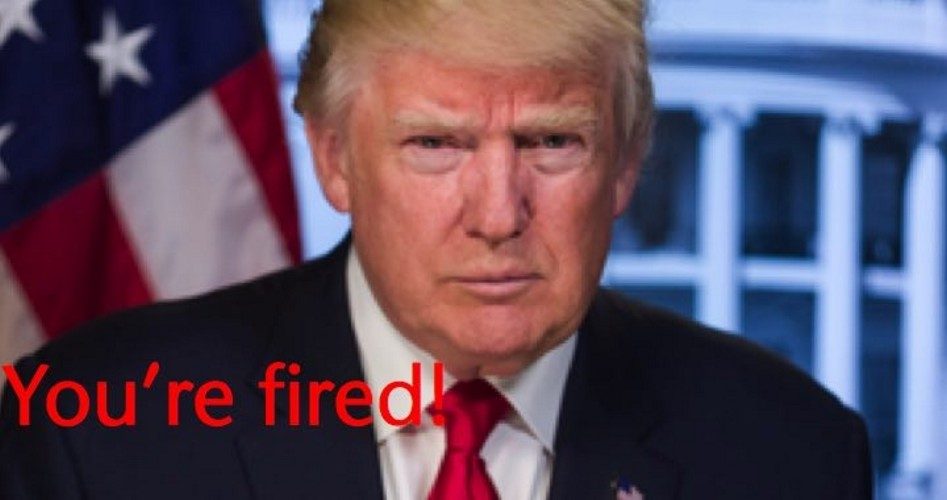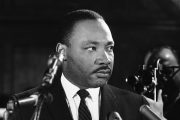
President Donald Trump’s comments about the protests during the playing of the National Anthem at National Football League (NFL) games at a political rally in Alabama on Friday predictably touched off a wave of comments over the weekend. Speaking at a campaign event for Republican U.S. Senate candidate Luther Strange on Friday, Trump said, “Wouldn’t you love to see one of these NFL owners, when somebody disrespects our flag, to say, ‘Get that son of a b**** off the field right now. Out. He’s fired.” Trump’s fiery remarks were met at the rally with thunderous applause.
But most of the reactions from players, owners, and commentators largely missed the point that an owner of an NFL team would be perfectly within his rights to remove a player from the field, and ultimately dismiss him from the team. Their responses were that this was somehow a violation of the First Amendment.
While one might question Trump’s choice of words to express his view, many of the responses indicated that, sadly, there is widespread ignorance of the actual meaning of the First Amendment’s protection of free speech. Actually, the First Amendment was written to prohibit Congress from passing any law abridging the freedom of speech. It does not apply to a business firing an employee for making political statements with which the business owner disagrees.
The reality is that individuals are fired every day in America for their political or social views. Google, for example, recently fired an employee, James Damore, who simply wrote a memo on gender diversity. Damore confirmed that he was terminated as an engineer at Google for “perpetuating gender stereotypes.” Then there was Brendan Eich, the CEO of Mozilla Firefox, who was forced out because he donated money to the referendum effort in California that put into that state’s constitution that marriage is between a man and a woman — a referendum that garnered a majority of the vote!
People on the Left tended to support those firings, arguing that the expression of such views can hurt the public image of the company.
But when it comes to dismissing a player for refusal to stand during the National Anthem, many of these same individuals argue that this cannot be done, because it would somehow be a violation of their rights as American citizens. This contradiction is clearly seen if one examines the words of some of those who criticized Trump for his remarks. Rich Eisen, host of NFL Game Day Morning, defended the right of players to protest during the playing of the National Anthem by “taking a knee or sitting down.” But, tellingly, he then added, “I just wanted to say this in case the President of the United States is out there that offensive speech should not be tolerated in this country.”
To which, one should ask Eisen who will decide what is “offensive speech” that “should not be tolerated”? Clearly, taking a knee during the playing of the National Anthem offends large numbers of people, including fans who buy the tickets or watch the games on television. The TV ratings for the NFL were significantly down last year, and NFL executives blamed everything but the anger of many fans who watched in disgust as several of the NFL’s employees publicly dissed the country.
“Cops are getting paid for killing people,” stated Colin Kaepernick, the former NFL quarterback who started the protests last season, in explaining his protests. But Kaepernick is inconsistent in opposing those who “kill people.” During last year’s controversy, it was revealed that he has a high regard for the late Fidel Castro, the Cuban communist dictator who killed thousands of people during his long reign.
While NFL Commissioner Roger Goodell responded to Trump’s remarks by saying that the president was showing disrespect for “all of our players,” NFL officials refused to allow the Dallas Cowboys to wear a decal on their helmets during the 2016 season to honor the five police officers murdered in an ambush during a Black Lives Matter rally in their city. The NFL argued that they could not allow the wearing of decals because of their strict rules against putting extra material on helmets. But some have noted that this was hypocritical because the NFL had allowed the Green Bay Packers to wear decals on their helmets to commemorate the 50th anniversary of Lambeau Field.
It appears the NFL is demonstrating a clear double standard in this whole affair. Players are required to wear jerseys and attend press conferences as a condition for being on the team; so clearly, they are required to follow certain rules to continue as employees in the league.
Most business owners actually do respect their employees’ political views (unlike the liberals at Google and Mozilla Firefox), and judge them by their job performance instead. However, in a free country, they do not have to. After all, they have their rights, too, and they do not want an employee who runs off their customers, which is apparently happening with these NFL protests and many fans, who are the customers of the NFL.
After all, should a restaurant owner be required to allow a waiter to walk around with a shirt sporting profanity, or support for a political cause or a political candidate, and cause customers to quit eating there? While the business owner probably would not care what political activity the employee does on his own time, he understandably would not want such controversial activity in the workplace. And it would be his right to forbid it.
Yet, when it comes to the NFL and its players, many commentators think the league’s most visible employees should be able to use their workplace to make very public social and political commentary, even at the risk of alienating many fans who simply want to watch a football game — fans who might well opt to do something else with their time.
Finally, what about Trump’s right to express his opinion? After all, he was not calling for the players to be fined or jailed by the government (legal ramifications), but rather to be dismissed by the owners. Since Trump has no legal authority to say, “You’re fired!” as he did on his popular TV show, The Apprentice, he is simply exercising his freedom of speech, like any other U.S. citizen. And while those who did not like his comments have their own perfect right to criticize him, they are betraying their ignorance when they give the impression that the players have a constitutionally protected right to trash the country and not be terminated from their high-paid employment of running up and down the field with a bag of zipped-up air.



